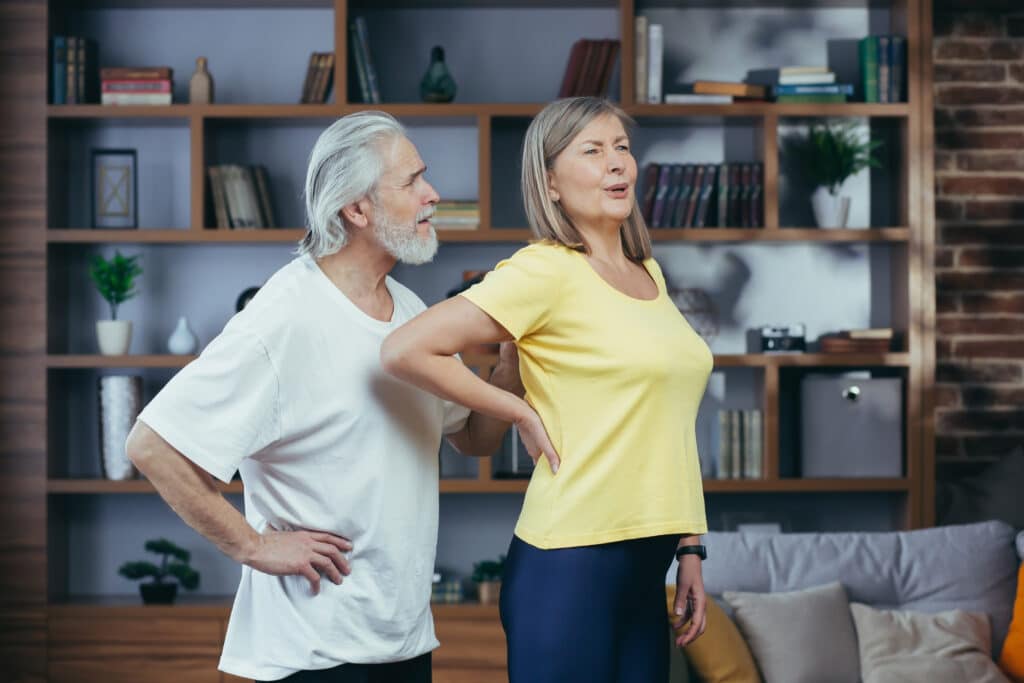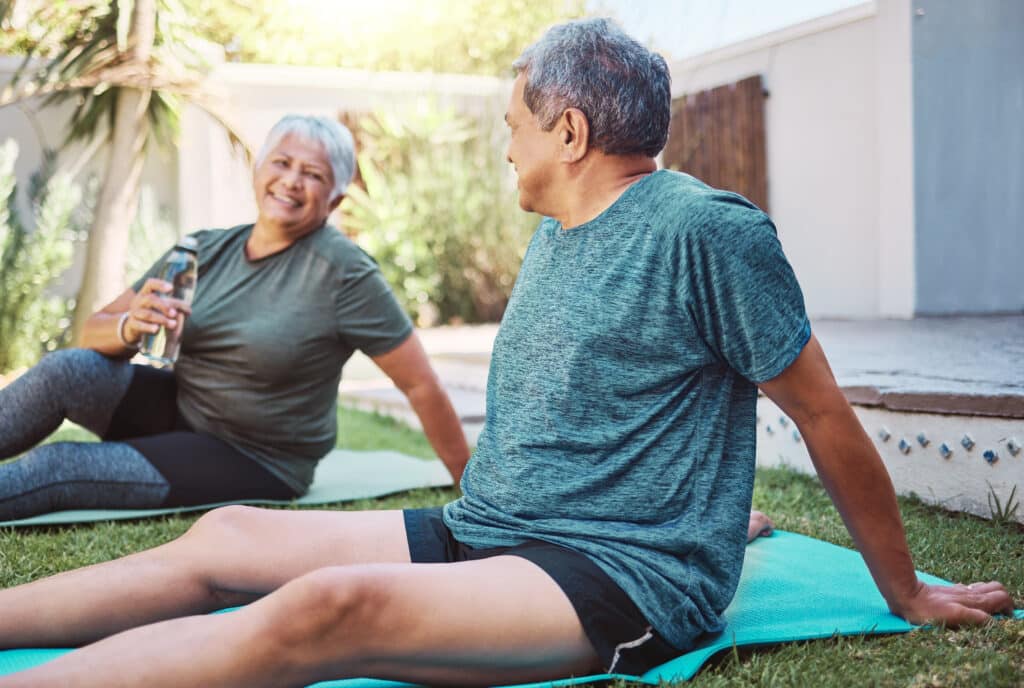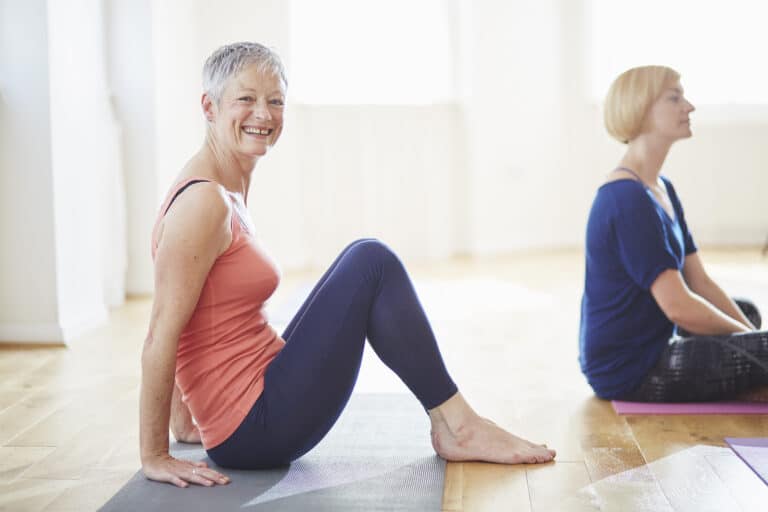Sex after 60 can present unique challenges due to various physiological and psychological factors. One prominent aspect is the natural aging process, which often leads to changes in hormonal levels, diminished muscle tone, and decreased blood flow, impacting sexual response.
Moreover, older individuals may encounter health issues such as arthritis or cardiovascular conditions that can contribute to discomfort or reduced mobility, making certain sexual positions more challenging.
Additionally, some people may say that the emotional and psychological aspects of aging, including stress, anxiety, or concerns about body image, can influence sexual desire and performance.
These factors collectively contribute to the complexity of sexual intercourse for older adults, necessitating a holistic approach that considers both physical and emotional well-being to foster a satisfying and fulfilling sexual life in later years.
In this article, we will explore the ins and outs of improving sex after 60 by examining some of the most important factors affecting sexual health with age.
Aging and Pelvic Floor Health
Some might say that sexual activity and desire taper off as we grow older, but let’s debunk that misconception right here, right now!
The truth? Maintaining an active and fulfilling sexual life is entirely possible and, quite frankly, beneficial as we age.
The first step for both men and women involves evaluating the health of the pelvic floor, an often overlooked component of the human anatomy.
Pelvic Floor Health: The Importance of Strengthening Your Core
One of the significant ways to maintain your sexual health as an older adult is to pay close attention to your pelvic floor health.
The pelvic floor is a group of muscles and connective tissues that form a supportive sling at the bottom of the pelvis. It is crucial in supporting pelvic organs, controlling bladder and bowel function, and promoting sexual health.
What is the Pelvic Floor and Why is it Important?
Did you know that approximately 50% of older women might experience pelvic floor disorders?1
These disorders can lead to urinary or fecal incontinence, pelvic pain, organ prolapse (where organs like the bladder, uterus, or rectum descend into the vaginal space) and discomfort during sexual intercourse.
These conditions may impact overall quality of life and sexual health, leading to discomfort or reduced sexual satisfaction. But there’s good news! Regular exercise can help strengthen the pelvic floor muscles, enhancing sexual function.
One such exercise is the Kegel exercise, a simple clench-and-release exercise that strengthens your pelvic floor muscles. You may have heard of this before, but often, when I tell my patients about it, they have yet to learn the proper technique. Here’s how to do them: imagine you’re trying to stop the urine flow or hold in gas. Simply squeeze briefly, then release.
That squeezing action is a Kegel exercise. You can do these exercises while sitting, standing, or lying down; no one will even know you’re doing them.
However, it’s important to note that practicing this technique while urinating is not recommended.
Your physical therapist can cue you to ensure you contract the targeted pelvic floor muscles rather than just holding your breath or bracing your core. Regular practice can help improve bladder control, support pelvic organs, and enhance sexual health.
Kegel exercises are more commonly prescribed to women, but they can be performed and have many benefits in men, too!
Pain Relief and the Path to Heightened Pleasure
Now let’s delve into the complex issue of pain during sexual activity in older adults, examining its causes, such as pelvic floor changes and hormonal shifts, and its prevalence.
We’ll explore a range of treatment strategies, from medications to lifestyle adjustments, aiming to alleviate discomfort and improve sexual pleasure.
Pain During Sexual Activity in Older Adults: A Closer Look at Causes

Pain during sexual activity is far from being a rare occurrence among older adults. If you’re experiencing this, know you’re not alone, and solutions are available. Studies suggest that more than 3 in 4 older women experience pain during intercourse.1
Sexual pain experienced by both men and women can be related to changes in the pelvic floor as part of the aging process. Conditions such as pelvic organ prolapse or urinary incontinence, more common in older adults, can strain the pelvic floor and cause pain during intercourse.2
Aging can impact blood circulation, affecting the genital region. Reduced blood flow to the pelvic floor may contribute to inadequate lubrication and sensitivity, making intercourse more uncomfortable.
Both men and women also experience hormonal changes as they age, which alter sexual function.
In women, a decline in estrogen levels during menopause can lead to vaginal dryness and thinning of the vaginal walls, contributing to pain during sex. In men, declining testosterone levels may affect erectile function and overall sexual response.
Alongside sexual dysfunction, our bodies undergo various changes as we age, such as arthritis, post-surgical scarring, or even medical conditions like diabetes that affect nerve health.
These comorbidities can impact any aspect of your mobility, causing increased stiffness, hypersensitivity, and pain. These problems can often feel overwhelming in any combination, so seeking medical help is always highly encouraged.
Understanding the Prevalence of Pain-Related Issues
Pain-related issues are more common among older adults than you might think. Data from the National Institutes of Health reveal that nearly 50% of adults aged 65 and older have been diagnosed with arthritis, a condition known to cause pain during sexual activity.
Furthermore, a study published in the Journal of Sexual Medicine found that nearly 30% of women and 5% of men over the age of 60 reported experiencing pain during their most recent sexual encounters.3
Exploring Treatment Options for Pain
As daunting as these numbers might be, it’s important to remember that pain can be managed and even reduced with the proper treatment approach. Let’s dive into some of these options.
Medication
Medication plays a pivotal role in the management of pain during sexual activity, especially for older adults.
Over-the-counter pain relievers like ibuprofen and acetaminophen offer a readily available first step for alleviating mild to moderate discomfort. However, when these options fall short, healthcare professionals may escalate treatment to include prescription-strength medications tailored to individual needs.
For specific conditions, such as arthritis, which can significantly hinder sexual activity due to pain and reduced mobility, doctors might suggest steroid injections to provide targeted relief. It’s also worth exploring the potential of topical analgesics for localized pain, offering a direct approach with minimal systemic effects.
Engaging in an open dialogue with a healthcare provider is crucial to identifying the most suitable medication strategy, ensuring it aligns with one’s overall health profile and the complexity of their pain management needs.
This tailored approach allows for a nuanced treatment plan that can significantly improve comfort and enhance the sexual experience.
Non-Pharmacological Interventions
Medication isn’t the only solution, though. Seeing a physical therapist specializing in pelvic health has been shown to help alleviate pain by improving strength and flexibility, especially with targeted pelvic floor exercises.
It is essential to go to a trained pelvic floor PT as not all physical therapists or clinics are equipped to handle this area of treatment. Improved muscle tone and flexibility can reduce pain and enhance sexual function.
Vaginal dryness is a common issue in older women. Water-based lubricants can provide additional moisture, reducing friction and discomfort during intercourse.
Tension in the vaginal walls can also make intercourse painful for women. Vaginal dilators allow for gradual stretching of the vaginal walls to improve flexibility and reduce pain during penetration.
Lifestyle Adjustments
Lifestyle changes can also play a significant role in managing pain. Regular exercise helps to keep joints flexible, while a healthy diet can reduce inflammation.
Staying hydrated and getting enough sleep are equally important, as both can impact your body’s ability to manage pain.
Techniques such as deep breathing, mindfulness, and progressive muscle relaxation can promote relaxation and reduce pain.
Pain during sexual activity is a common issue among older adults, but it doesn’t have to be a permanent one. With the right combination of medication, non-pharmacological interventions, and lifestyle changes, you can manage your pain and continue to enjoy a fulfilling sex life well into your golden years.
Male Treatment Options

Sexual health challenges such as erectile dysfunction, decreased libido, and prostate issues are common in older men. Understanding these conditions and the available treatments, from medications like Viagra to lifestyle changes such as diet and exercise, is crucial for maintaining sexual wellness.
Here are some insights into navigating these concerns, emphasizing the importance of seeking professional help for a healthier and happier sex life.
Strategies for Men’s Sexual Health
Sexual health issues are not gender-specific. Older men also face challenges, with erectile dysfunction being a common concern. Did you know that up to 52% of men experience some form of erectile dysfunction?
The likelihood of ED increases by 10% with each decade of life. This means that by the time a man reaches 70, he has about a 70% chance of having some degree of ED.4
Understanding Age-Related Male Sexual Health Challenges
Aging is a natural process, and with it comes unique challenges in many areas of life, including sexual health. For men over 50, these challenges can be particularly significant. As a medical professional with years of experience treating patients in this age group, I’ve seen firsthand how these issues can impact quality of life.
Research shows that men may face a variety of sexual health concerns as they age, including decreased sex drive, erectile dysfunction, and prostate health issues.
The National Institute on Aging states that about half of men in their 60s have an enlarged prostate, a condition known as benign prostatic hyperplasia (BPH). This condition can cause uncomfortable urinary symptoms and affect sexual function.4
Navigating Treatment Options for Men

However, a wide range of treatment options is available, from medical interventions like Viagra to lifestyle modifications such as reducing alcohol intake. If you’re facing these issues, don’t hesitate to seek professional help.
Medical interventions are often the first line of treatment. For ED, options might include medications, vacuum erection devices, or even surgery in some cases. For an enlarged prostate, medication or minimally invasive therapies can help alleviate symptoms.
Don’t underestimate the power of lifestyle changes. Maintaining a healthy weight, regular exercise, a balanced diet, quitting smoking, and decreasing alcohol consumption can all contribute to improved sexual health. Consistent moderate exercise can significantly help improve sexual response in men.
It’s crucial to seek professional help if you’re experiencing sexual health issues. A healthcare provider can offer personalized advice and treatment options. They can also rule out any underlying health conditions contributing to your symptoms.
Body Mechanics for Enhanced Pleasure
Optimizing body mechanics is key to enhancing sexual satisfaction, especially as we age. Good positioning, flexibility, and stamina, improved through regular exercise, can significantly affect sexual experiences.
This includes adopting comfortable positions, using supports like pillows, and engaging in yoga, aerobic exercises, and strength training to boost body mechanics. These adjustments and practices can lead to greater comfort, reduced discomfort, and heightened pleasure during sexual activities.
The Impact of Body Mechanics on Sexual Satisfaction
Body mechanics play an essential role in sexual satisfaction. A recent study found that poor body mechanics can lead to discomfort and diminished sexual satisfaction, particularly in older adults.5
Positioning, flexibility, and stamina can significantly impact your sexual experiences. Regular exercises targeting flexibility, core strength, and cardiovascular health can improve body mechanics and enhance sexual pleasure.
As we age, many factors can influence our sexual satisfaction. One factor often overlooked is body mechanics. Body mechanics refers to how we move and position our bodies in daily activities, including sexual interactions.
Once underlying medical, hormonal, and muscular deficits are addressed, it is imperative to find the positions that work best for you to enjoy intercourse.
The Role of Body Mechanics in Sexual Experiences
Why are body mechanics so crucial in sexual experiences? In short, poor body mechanics can lead to pain, discomfort, and even injury. These issues can significantly hamper sexual satisfaction and general quality of life.
On the other hand, good body mechanics can promote comfort, pleasure, and overall sexual satisfaction.
In my years of practice, I’ve found that patients who focus on improving their body mechanics tend to report enhanced sexual experiences. They also express less discomfort and a heightened sense of pleasure. This is not a coincidence; it directly results from optimizing body mechanics.
Optimizing Body Mechanics for Enhanced Pleasure

So, how can we improve our body mechanics for better sexual experiences? Here are some practical tips:
Positioning Tips
In sexual experiences, positioning is critical to pleasure. However, poor positioning can lead to discomfort and even injury. Here’s what you can do:
- Experiment with different positions: Some positions may be more comfortable and pleasurable. Feel free to experiment and find what works best for you and your partner. Positions such as both partners in side-lying, modified missionary positions, and positions that allow at least one partner to be seated can be great options.
- Use pillows or wedges: Pillows can support and help maintain good body alignment during sexual experiences. They can also alleviate pressure on joints.
- Listen to your body: If a position causes discomfort, don’t push through the pain. Adjust your position or try something different.
Exercise Recommendations for Improved Flexibility and Stamina
Regular physical activity can significantly improve body mechanics. Here are some types of exercises that can help:
- Yoga: Yoga can improve flexibility, balance, and strength, all of which can enhance body mechanics. A yoga routine suitable for older adults can be found on physioed.com.
- Aerobic exercises: Walking, swimming, cycling, or dancing can improve stamina and cardiovascular health, improving sexual experiences.
- Strength training: Muscular strength can improve body mechanics and enhance sexual satisfaction. Consider including strength training exercises in your routine.
Paying attention to your body mechanics can significantly enhance your sexual satisfaction as you age. With a few simple adjustments and regular exercise, you can optimize your body mechanics for better sexual experiences. Always remember to consult your healthcare provider before starting any new exercise regimen.
Remember, it’s never too late to improve your body mechanics. With the correct information and a little effort, you can enhance your sexual experiences and overall quality of life.
Summary
In summary, navigating the complexities of sexual health in older adulthood requires a comprehensive approach that addresses both the physical and emotional aspects of aging. Key strategies include maintaining pelvic floor health through exercises like Kegels, managing pain through a combination of medication, non-pharmacological treatments, and lifestyle changes, and improving body mechanics for enhanced sexual pleasure.
Additionally, both men and women can face specific sexual health challenges as they age, with erectile dysfunction being a prominent concern for men. However, with the right interventions and adjustments, older adults can continue to enjoy a vibrant and fulfilling sexual life, underscoring the importance of seeking professional help when needed.
Key Takeaways
- Sexual intercourse in older adults presents challenges due to physiological and psychological changes, including hormonal level changes, decreased muscle tone, and health issues like arthritis, affecting sexual response and comfort.
- Pelvic floor health is crucial for maintaining sexual health in older adults, with exercises like Kegels enhancing sexual function by strengthening pelvic floor muscles.
- Pain during sexual activity is common among older adults, related to changes in the pelvic floor, hormonal changes, and other age-related conditions, but can be managed with medication, non-pharmacological interventions, and lifestyle adjustments.
- Erectile dysfunction (ED) is a significant concern for older men, with treatments ranging from medical interventions like Viagra to lifestyle changes such as regular exercise and dietary adjustments.
- Body mechanics, including positioning, flexibility, and stamina, play a crucial role in sexual satisfaction, with exercises like yoga and aerobic activities enhancing sexual experiences.
- Addressing sexual health challenges holistically, incorporating regular exercise targeting pelvic health and body mechanics, can significantly improve sexual function and satisfaction in aging adults.
- Professional help should be sought for pain or discomfort during sexual activity, with multiple treatment options available to maintain a satisfying and fulfilling sexual life in later years.
FAQs
How can older adults adapt their sexual activities to accommodate physical changes or limitations?
Older adults can adapt to sexual activities by exploring different positions that reduce stress on the body, utilizing aids like pillows for support, and embracing non-penetrative forms of intimacy that are comfortable and satisfying for both partners.
What strategies can help manage decreased libido in older adults due to hormonal changes?
Strategies for managing decreased libido include discussing hormone replacement therapy options with healthcare providers, integrating stress-reduction techniques such as meditation and yoga, and fostering emotional intimacy with partners.
Can regular physical activity improve sexual health in older adults, and what types are most beneficial?
Yes, regular physical activity can significantly improve sexual health by enhancing cardiovascular health, flexibility, and endorphin levels. Activities like swimming, brisk walking, and tailored fitness classes for older adults are particularly beneficial.
What are effective communication tips for older adults discussing sexual health with their healthcare providers?
Effective communication tips include preparing a list of questions or concerns before appointments, being open and honest about sexual activities and experiences, and requesting referrals to specialists in sexual health or geriatric care if needed.
How can older adults and their partners address emotional and psychological barriers to a fulfilling sexual relationship?
Addressing emotional and psychological barriers involves seeking couples counseling or therapy to navigate communication challenges, rebuilding intimacy through shared activities and experiences, and setting aside time for honest discussions about each partner’s needs and desires.
What role do pelvic floor exercises play in enhancing sexual function, and are they beneficial for men as well as women?
Pelvic floor exercises, such as Kegels, play a significant role in enhancing sexual function by improving muscle tone, bladder control, and orgasm intensity. These exercises benefit both men and women, contributing to erectile function and pelvic health.
References
- Gelfand, M. M. (2000). Sexuality among older women. Journal of women’s health & gender-based medicine, 9(1, Supplement 1), 15-20.
- Jelovsek, J. E., Maher, C., & Barber, M. D. (2007). Pelvic organ prolapse. The Lancet, 369(9566), 1027-1038.
- Wade, K., Wu, F. C., O’Neill, T. W., & Lee, D. M. (2018). Association between pain and sexual health in older people: Results from the English Longitudinal Study of Ageing. Pain, 159(3), 460-468.
- Feldman, H. A., Goldstein, I., Hatzichristou, D. G., Krane, R. J., & McKinlay, J. B. (1994). Impotence and its medical and psychosocial correlates: results of the Massachusetts Male Aging Study. The Journal of Urology, 151(1), 54–61. https://doi.org/10.1016/s0022-5347(17)34871-1
- Rheaume, C., & Mitty, E. (2008). Sexuality and intimacy in older adults. Geriatric Nursing, 29(5), 342-349.






